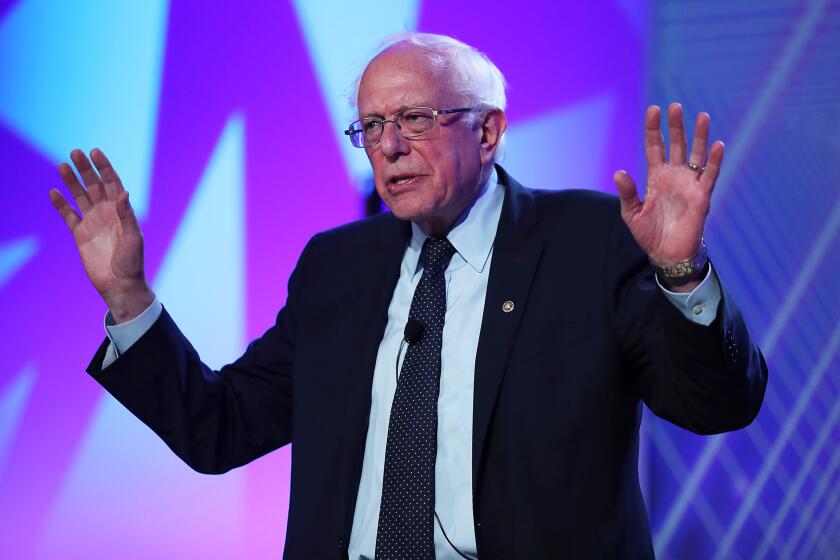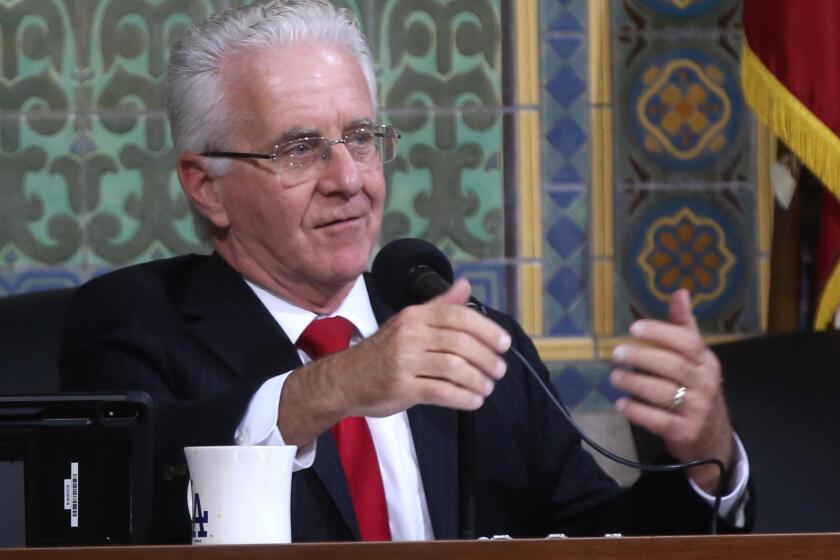CALIFORNIA ELECTIONS PROPOSITIONS : Term Limits Would Oust Lawmakers and a System
Tapping a wellspring of public antipathy to the institutions of government, backers of two November ballot measures that would limit terms of officeholders appear on the verge of transforming the face of California politics as few have done before.
If either Proposition 131 or 140 is approved--and polls show both leading by wide margins--state lawmakers, the governor and other state elected officials will for the first time face limits on their tenure in office. The result, say the initiatives’ sponsors, is the Legislature’s entrenched leadership ultimately will be swept from office and “lifetime politicians” will be replaced by “citizen-legislators.”
Critics don’t argue with the popular appeal of the measures’ anti-incumbent message. But they foresee a far different outcome: A Legislature with few real experts, where lawmakers are even more obsessed with moving up and few have the experience and political savvy to resist lobbyists and the empire building of career bureaucrats.
The term limits would result in the biggest upheaval in electoral politics in the state since 1966, when the U.S. Supreme Court’s landmark one-man, one-vote decision was implemented. With that ruling, large-population counties received proportionately more representation in the Legislature, bringing in 22 new senators, a majority of the 40-member Senate, and 33 new lawmakers to the 80-member Assembly.
The move toward term limits also reflects more widespread political unrest, spawned by a common message that is being delivered to incumbent officeholders: Serve out the limit and move on.
“The mood is real simple,” said blunt-talking Los Angeles County Supervisor Pete Schabarum, chief sponsor of Proposition 140. “And that is the folks are really ticked or fed up--call it what you will--over how legislative bodies are conducting themselves.”
Proposition 140 would limit lifetime service in the Assembly to six years, in the Senate to eight; Proposition 131 would force members of each house to move on after 12 consecutive years. Both measures limit most statewide elected officials to eight years in office, but Proposition 131 would allow them to run again after sitting out a term.
Additionally, Proposition 131 would provide partial public funding of all state political campaigns, paid for out of a taxpayer-supported campaign fund. It imposes limits on campaign contributions and expenditures, bans off-year campaign fund raising, and establishes a special prosecutor’s office to pursue public corruption cases. Proposition 140 would slash the Legislature’s operating budget in half, forcing massive staff lay-offs, and would eliminate the legislators’ retirement system.
Should both initiatives pass, term limits would be set by the one getting more votes, but all the other provisions of both ballot measures would go into effect.
Opponents of the two constitutional amendments say the measures represent a kind of coup d’etat by initiative--a flagrant attack on basic democracy that denies voters the right to keep returning to office the most experienced and effective politicians.
“Term limits are a come-on for another agenda,” said Jay Ziegler, spokesman for the No on 131 and 140 campaign. “In the case of 131 it’s clearly campaign financing. In the case of 140, it’s to turn back the clock 25 years to a time when the Legislature was totally dependent on special interests and government bureaucrats.”
Some view passage of either measure as a major step in a movement--begun in Oklahoma last month--to impose term limits on legislators in all 50 states, and eventually on members of Congress.
“This is a national movement and we’re the big banana,” said Senate President Pro Tem David A. Roberti (D-Los Angeles), a bitter foe of both ballot measures--and one of a number of mid-term senators who would be forced from office in 1996 if Proposition 140 prevails.
In what is proving to be a roaring battle over term limits, both sides in the debate agree that either of the measures would change fundamentally the way politics is conducted in the nation’s most populous state.
Under Proposition 140, with its shorter term limits, 83% of the politicians who take seats in the Assembly and Senate later this year would be swept from office by 1996. By 1998, 100% of the legislators would be unseated.
“It would be wild,” said Eugene C. Lee, professor emeritus in political science at UC Berkeley. “The consequences are unpredictable.”
Under both measures, the governor, attorney general and most other constitutional officers would be held to the eight-year limits--guaranteeing that no one who wins one of the major offices Nov. 6 would be able to serve continuously past 1998.
Supporters of both measures reach for a broom when groping for a symbol of their intentions.
The two ballot initiatives have brought together a curious coalition of forces. They are of the right and of the left; laissez-faire conservatives and environmental activists; those who want more government regulation and those who believe that government has intruded far too much.
Proposition 131 was crafted by Atty. Gen. John K. Van de Kamp, a liberal Democrat, as part of his unsuccessful campaign to become governor.
Schabarum, the best-known author of Proposition 140, is a conservative Republican. Sensing a groundswell of frustration with the Legislature, Republican gubernatorial candidate Pete Wilson has also endorsed the initiative.
A recent Los Angeles Times Poll found strong support for both term-limit initiatives and deep frustration with how the state Legislature is handling its job. However, most voters with an opinion said their own legislators deserve to be reelected.
The September poll showed 55% of voters supporting Schabarum’s Proposition 140 and 28% in opposition. Proposition 131 was only slightly less popular, with 50% saying they would vote for the initiative, 34% against it. Other polls have shown even stronger support for the two measures.
Although Wilson, Schabarum and Van de Kamp are veteran politicians, supporters of the initiatives for the most part are frustrated outsiders trying to crash a political system that they view as unresponsive. Their common view is that incumbents have all the advantages when challenged at the polls and that it has become increasingly difficult to oust them.
Some observers believe that the term-limit question might have been avoided entirely if earlier attempts to change the way legislative districts are determined through reapportionment had been successful, opening the way for more competitive legislative races.
“There is a sense of frustration that nothing else has worked,” said former Assembly Speaker Bob Monagan (R-Tracy). He said the efforts of “entrenched incumbents not to do anything about reapportionment” were at least partly responsible for strong support for term limits.
There is so little competition in legislative races that in the past three general and primary elections, from 1984 through 1988, only five incumbent legislators were defeated at the polls.
In 15 out of 100 races for state Senate and Assembly this year, incumbents have no major party challengers and are virtually certain of reelection.
Despite all of that, opponents of term limits argue that the natural rate of turnover is quite high. Nineteen of 40 state senators in office after the 1980 election have since left the Senate; 41 out of 80 Assembly members are no longer in the Assembly. Put another way, exactly half of the 120 lawmakers remain in the same jobs a decade later.
As might be expected, the top legislative leaders in both parties rank high in length of service, headed by Assembly Speaker Willie Brown (D-San Francisco) with 26 years in the Assembly and Roberti, who has served 19 years in the Senate. Both have remained in office well beyond the average--just under 11 years in the Senate and nearly eight years in the Assembly.
Not surprisingly, Brown and Roberti, along with Assembly Republican Leader Ross Johnson of La Habra and Senate GOP Leader Ken Maddy of Fresno, are publicly committed to defeating the term-limit initiatives--arguing vociferously that without experienced legislators to lead the Senate and the Assembly, the Legislature would soon be dominated by the governor, executive branch bureaucrats and lobbyists.
Although Brown has been actively and openly raising funds for what is expected to be a difficult and expensive campaign, his aides have recently been counseling a low profile on the campaign trail, conceding that many voters tend to focus their frustrations with the Legislature on the Speaker and his allies.
Brown has been more active than any of the others in raising money to defeat the initiative. As proponents of the two measures are quick to point out, the Democratic Speaker has turned to special-interest groups to pay for the opposition campaign.
Brown’s initiative campaign committee reported raising $982,489 in the last three months--receiving most of the money from corporations, unions and political action committees representing groups that regularly lobby the Legislature. Among the largest contributors were the California Teachers Assn., $40,000; RJR Nabisco, $25,000, and the California Beer and Wine Wholesalers, $20,000.
Proponents of both measures make it clear that legislative leaders are their target.
“At this point there is a tiny oligarchy running the show,” said California Common Cause director Jim Wheaton, now on leave to run the Yes on 131 campaign. “The people who are left out are people who care about people or causes but don’t have any money.”
One of the main sponsors of Proposition 140, Lewis K. Uhler, is president of the National Tax Limitation Committee--a group seeking a constitutional amendment to balance the federal budget. Uhler has attacked the Democratic leadership of the Legislature, people he regards as big spenders. He believes that faster turnover in the Legislature would improve the chances for “our kind of people”--conservative legislators willing to cut government spending.
With passage of either measure, California would join 26 other states that now limit the terms governors may serve, as well as the many states that also place limits on other statewide offices.
Since statehood 140 years ago, only one California governor has ever been elected three times--Republican Earl Warren, who left in the middle of his final term to become chief justice of the United States.
But other constitutional officers have had more staying power, including several in this century who managed to hold on to their elected jobs until they died in office.
At the heart of the debate over the term limits, especially as they apply to the Legislature, is who would be in charge once the new limits take effect.
Opponents contend that the effect would be to force out of office many of the most effective legislators--seasoned lawmakers who are so well entrenched that they can stand up to special interests.
“I’ve seen Willie Brown close down those interests,” said one Democratic legislative staffer. “I’ve heard him say, in effect, ‘I’m more powerful than you are. So, no way.’ ”
Brown himself, at a press briefing two months ago, contended that inexperienced legislators would be easy prey for lobbyists.
“My guess is that in this one, the sleazy, cold-blooded special interests are going to see an opportunity and they’re going to be supporting (the Schabarum initiative) because, believe me, they will dominate, they will dominate,” Brown said.
At the same session, Brown asked reporters: “Would you prefer to be administered for your brain tumor by the surgeon who graduated this year, or by the surgeon who has been practicing for 10 years and never lost a patient?”
Consumer activist Ralph Nader, who is campaigning around the state in support of Proposition 131, insists that a new crop of legislators would not be hampered by their inexperience.
“If there is one job you can learn fast, it is the job of being legislator if you have the people’s interests in mind,” Nader said. “If you’re going to balance all kinds of special interests and deal in that kind of intrigue, it does take a while to learn the trade.”
While proponents of one initiative are sometimes critical of the other, for the most part both camps are saving their harshest rhetoric for the Legislature itself.
They recite a similar litany of problems besetting California government: this year’s lengthy budget impasse, a widening Capitol corruption scandal that has already led to the conviction of two former state senators, and an inability to settle important issues facing the state, such as rising insurance rates and increasing traffic congestion.
Although they accuse the legislative leadership--and in particular Brown--of kowtowing to the special interests, the chief backers of both term-limit initiatives insist that the Speaker is not their target.
“We are not stating here that there are a lot of evil people in Sacramento,” said San Jose Mayor Tom McEnery, one of the organizers of the Yes on 131 effort. “What we’re saying is that there are people who have turned into rascals. They are really kind of caught in the system, where money is the end-all of everything.”
But supporters of Propositions 131 and 140 have attempted to capitalize on what they see as widespread distrust of Brown.
Jim Wheaton of the Yes on 131 campaign has attacked Brown as “king of the special interests.”
Similarly, backers of Proposition 140 ask in a campaign brochure, above a picture of Brown at the Assembly rostrum, “Should this Speaker of the State Assembly have the power to directly affect the lives, the property and the financial security of every Californian?”
As Speaker of the Assembly, Brown is the most powerful member of the Legislature, able to appoint the committees that can determine the fate of any piece of legislation. Because of the power of the office, speakers have traditionally been the Legislature’s top fund-raisers and the principal spokesmen for the majority party in the Assembly.
In Brown’s case, his flamboyant style and quick, sometimes biting wit have made him an especially attractive target for critics of the Legislature. For now, his aides say, Brown’s best way of fighting back is to remain in the background if he wants to succeed in preserving the Legislature as he knows it.
RULING ON FINANCING: High court refuses to reinstate California’s campaign contribution limits. A28
RELATED POLITICAL STORIES A28-31, 33-34
More to Read
Get the L.A. Times Politics newsletter
Deeply reported insights into legislation, politics and policy from Sacramento, Washington and beyond. In your inbox three times per week.
You may occasionally receive promotional content from the Los Angeles Times.






